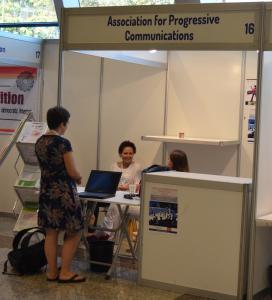
Participating in the 2014 IGF in Istanbul opened up a wide range of opportunities for both my own organisation and for APC, including new possibilities for partnerships, cooperation and impact.
In terms of my own organisation, the first surprise of the event was encountering another, newly created Paraguayan civil society organisation, TEDIC, through one of its members, Maricarmen Sequera, who was attending the same session on net neutrality. (One of the speakers at that session was Claudio Ruiz of Chilean APC member organisation Derechos Digitales). We agreed to work together in the future, which I believe will strengthen my own organisation’s work around urban and rural telecentres in urban and rural areas. We will also join forces in an attempt to influence the new telecommunications law in Paraguay. Although we participated in the drafting of the telecommunications law in 1995, it is now rather obsolete when it comes to internet-related regulations.
Another striking factor for me was the absence of Paraguayan government representatives from the ICT sector, including the National Telecommunications Commission (CONATEL) and the National Secretariat for ICT. This serves as a good indicator of the work that still needs to be done to position ICT-related issues on the government agenda as well as the civil society agenda.
Before travelling to the IGF I had the opportunity to meet with the president of CONATEL, Eduardo Neri González, and we arranged a second meeting after my return, in order to discuss the issues addressed at the IGF, which could have a considerable impact on the new telecommunications law.
In the meantime, I was able to resume ongoing talks with Brazilian government representatives, including Carlos Afonso and others with whom we have been collaborating for several years. Our plans for joint free and open source software projects were interrupted by the 2012 parliamentary coup in Paraguay and the subsequent suspension of the country’s membership in Mercosur. We have now reached an agreement by which the Brazilian embassy in Paraguay will support the joint organisation, with CONATEL, of a seminar at which we will address issues related to accessibility, internet governance, net neutrality and others in which Brazil has achieved a high degree of development and is willing to carry out technical cooperation projects with Paraguay. The Brazilian partners can also share the advances they have made in telecommunications legislation.
While our relations with Colombian government representatives do not date as far back as those with Brazil, this cooperation can be boosted through the intermediation of Colombian APC member organisation Colnodo, since we have close ties with the Colombian embassy in Asunción. This is an area that we can work on in the medium term.
An especially valuable activity was a meeting organised by APC which brought together member organisation representatives from Latin America and the Caribbean and representatives of international cooperation agencies. In a setting of friendly exchange, the various APC member organisations shared information on the situation in their countries and on the work that they are doing, while the presentations by the cooperation agencies opened up opportunities for bilateral or multilateral partnerships for future activities, based on the needs of the organisations and the possibilities offered for cooperation.
I personally was able to enter into contact with several cooperation agencies from the United States, and we are currently studying the presentation of new proposals.
In terms of opportunities for APC, the member meeting held the day before the official opening of the IGF made it possible to bring together the participating APC member organisations, board members and staff members. Together they were able to analyse the vast range of activities forming part of the marathonic agenda, and to define the participation of each of the regions and the points of key interest for APC, in order to make the largest possible institutional impact.
During the IGF itself, we were able to find numerous APC members forming part of round tables, workshops and other sessions, addressing central issues like net neutrality, which is an area that I consider to be a strong point for APC, and one where it can make a valuable contribution.
Another area in which APC can be extremely influential is that of women’s rights and online violence against women. This is an area in which APC has acquired a high degree of knowledge and experience, and it could therefore help to position these issues higher on the IGF agenda, as they were given little emphasis at the plenary sessions.
Overall, APC achieved an institutional presence that could not go unnoticed at this widely attended and far-reaching event. This was the result of active and broad participation in debates, panels and workshops. APC was one of the civil society organisations that contributed ideas, proposals and a presence in different regions of the world with a clear identity, reflecting the work carried out at the last APC member meeting as well its strategic plan.